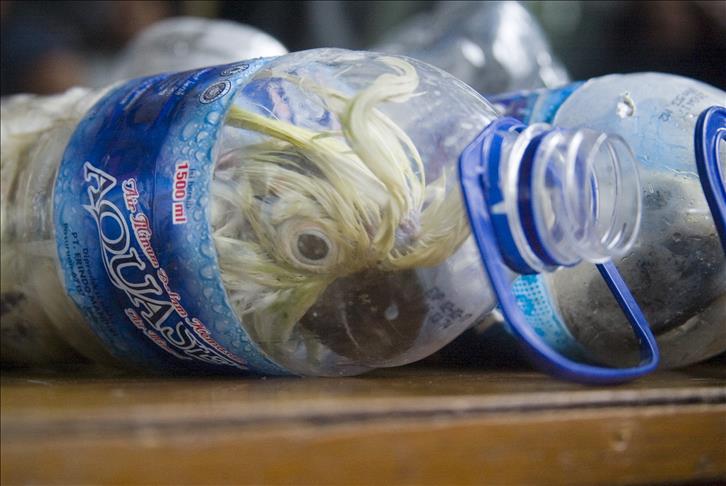Indonesian smuggler 'hid birds in plastic bottles'
In 2014, ProFauna recorded 4000-5000 protected birds caught for sale in the Maluku and Papua

By Ainur Romah
JAKARTA
Indonesia ProFauna organization based in Malang, Indonesia, call government to tighten the observation to the illegal smuggling of protected animal via public transportation.
Rosek Nursahid, Chairman of ProFauna Indonesia, said Tanjung Perak Port in Surabaya, East Java, believed to be a transit point for trafficking of protected wildlife that will be sold to several major cities in Indonesia such as Semarang, Jakarta and Yogyakarta. Most animals remain carried by sea and sold to overseas such as the Philippines.
During 2015, ProFauna recorded five cases of smuggling protected animals through the port of Surabaya. Police seized hundreds of protected birds such as parrots, yellow-crested cockatoo, and black palm cockatoo from the smugglers who brought them from the island of Maluku and Papua.
"We asked the transportation department in order to tighten oversight of passengers," said Rosek to Anadolu Agency on Wednesday. "There should be a ban on bringing protected animals in public transportation such as train, aircraft, boat and bus,"
In 2014, ProFauna recorded 4000-5000 protected birds caught for sale in the Maluku and Papua.
Rosek said, ProFauna has launched a report in 2002 titled "Flying Without Wing", revealing the traffic lane of parrot and cockatoo smuggling from East Indonesia island to Java island and foreign countries. The report said Tanjung Perak Port in Surabaya to be the main chain of the illegal smuggling. From the Port, birds then distributed to another big cities in indonesia.
"The pattern and method (of smuggling) not much different from 2002 to 2015. It shows that there is a weak observation in the Port,"
On Monday, Indonesian police has captured a man allegedly trying to smuggle protected parrots that are inserted into the bottle on a ship in the Port of Tanjung Perak, Surabaya, East Java.
"We received information there was smuggling of protected species. Once we conduct a search on the boat, we catch someone carrying a cockatoo," said police officer in the Port of Tanjung Perak, AKP Aldy Sulaiman to reporters on Monday, as quoted by Antara News.
A man, Mulyono (37), was arrested with two birds, a Yellow-crested cockatoo and a Green parrot. In the same boat, police also seize 21 Yellow-crested cockatoo that Mulyono didn't admitted his own.
"The 21 birds are protected, put on the bottles of mineral water," he said.
Aldy said smuggled birds were kept in the bottle to keep from flapping its wings, and to avoid suspicion in the investigation.
The birds price in the domestic market about $ 1,500 or equivalent to Rp. 2 million each.
In front of police, Mulyono admitted only bring two birds obtained from friends in Ambon, Maluku, and do not know the 21 other birds.
He claimed will keep the birds on his own. "I was told to take care of. He (friend) said they are stupid bird," he said. Mulyono also claimed not to know that these birds including protected animals.
If convicted, Mulyono will be subject to the chapter on Conservation of Natural Resources and Ecosystems with a penalty of up to five years in prison and a fine of Rp 100 million.
Rosek said protected animal trading pattern has now changed, from conventional trade in the market, to be trading online through social media such as Facebook, Twitter, and Instagram.
In 2014, Pro Fauna noted there were 3,600 cases wildlife trade via online in Indonesia, increase 300 percent compared to 2012.
"Most of the animals sold from the eastern Indonesian region like Cendrawasih (bird original habitat in Papua), yellow-crested cockatoo, black head parrot," said Rosek.
In the investigation report, said Rosek, revealed approximately 15,000 parrots and cockatoos are caught from the wild for both domestic trade and smuggled abroad. Bird trade value is estimated at Rp 10 billion per year.
The death rate of parrot in trading process is very high reaching 40%. They die because of cruel capture methods, bad transportation, and poor maintenance (small cage, put into bottle).
Based on the results of a survey conducted by ProFauna found there is shift in the age of purchasers of animals. "Because there are a change from the conventional to wildlife trade online, there is also a shift in the consumer," he said.
"If 15 years ago the consumer wildlife trade are people aged 40 years and above, buyers now spread to young people. High school student and college students become consumers because they are influenced by advertising in social media," he said again.
The number of young people who form a community of animal lovers also sparked rampant wildlife trade.
Anadolu Agency website contains only a portion of the news stories offered to subscribers in the AA News Broadcasting System (HAS), and in summarized form. Please contact us for subscription options.







